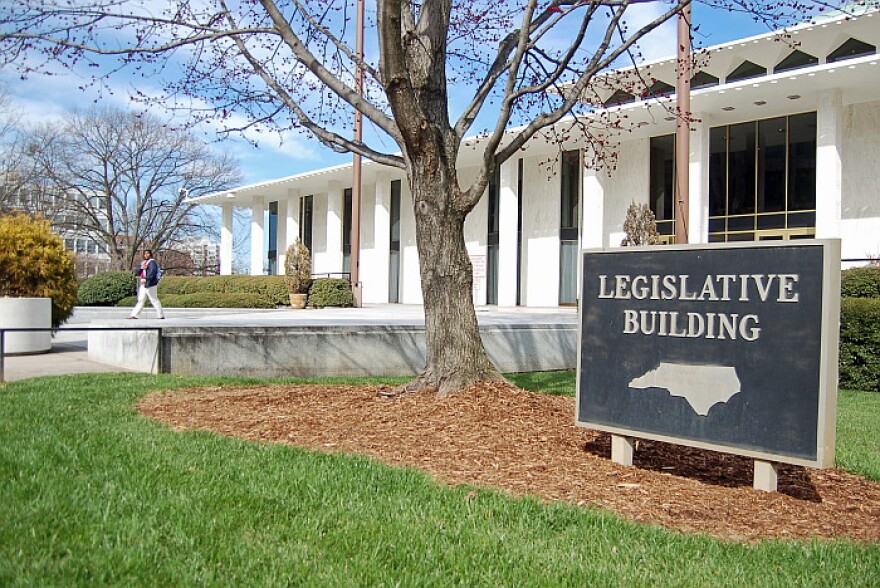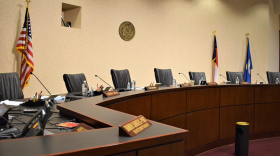WUNC has all the coverage you need this election season. Be sure to check out our Races To Watch stories for everything you need to know about candidates in statewide, congressional and legislative elections. Subscribe to WUNC's Politics Podcast and follow reporters Rusty Jacobs and Jeff Tiberii on Twitter. Early voting begins on Oct. 20.
While North Carolinians will make important decisions in statewide races for the U.S. Senate and state Supreme Court, and send new representatives to the U.S. House in some districts, there is much at stake in this midterm election regarding the future of state law.
Entering this election season, Republicans are just five seats shy of a supermajority in the state legislature, needing to gain three in the state House and two seats in the state Senate. Both parties will be pouring money and resources into races that can be viewed as potential pick-ups.
The GOP needs those seats — again, three in the House and two in the Senate — to muster the three-fifths majority of those present needed to overturn Democratic Gov. Roy Cooper’s vetoes. The NC GOP last had a supermajority from 2013 to 2018. During Cooper’s first two years in office, Republicans overrode him on 23 of his 28 vetoes. Since then, Cooper has sustained his last 47 vetoes.
For the North Carolina General Assembly, this fall's election is less a question of which party will have control, but rather just how dominant that power will be. A veto-proof lane could give Republicans unchecked authority. Presently, Republicans have comfortable majorities in both chambers, but they do not have so-called supermajority margins. That gives Cooper a much greater line of defense for Democratic and progressive causes.
Democrat and Republican operatives who spoke to WUNC for this story widely agree that there is virtually no path for Democrats to take a majority of the Senate. There is a very narrow path under which Democrats could win 61 seats – and a majority – in the state House.
The potential of a veto-proof supermajority for Republicans would especially be crucial to the future of abortion laws in the state, following the U.S. Supreme Court’s decisionto overturn Roe v. Wade. North Carolina is one of the few southern states that did not have a trigger ban on abortions in-place.
A handful of legislative races will determine the policy fate of the state, mostly located in suburban areas. In addition to abortion, hanging in the balance is legislation on education, elections, guns and – among other areas – taxes. A supermajority would give the Republican legislature much greater autonomy to enact policy of its choosing.
Here are the potential toss-up races that we’re watching in the state legislature.
State Senate
17th District (Wake County)
- Sydney Batch (D)
- Mark Cavaliero (R)
- Patrick Bowersox (L)

Batch is the incumbent in this race. She was first elected to the NC General Assembly in 2018, winning a race for the 37th District House seat back then by just two percentage points — just 944 votes. She then lost her bid for reelection in 2020 by 3.3 points in 2020. But in 2021, Cooper appointed her to the vacant state Senate seat in this district after Sam Searcy resigned. Cavaliero lost this seat to Searcy in 2020 by 6.6 points, nearly 11,000 votes. He’s never held elected office before; he is a former Marine Corps. Colonel and is the founder and former CEO of Carolinas IT.
18th District (Granville County)
- Mary Wills Bode (D)
- E.C. Sykes (R)
- Ryan Brown (L)
This is a new seat that runs from northern Raleigh through Granville County and up to the Virginia border. Neither of the leading candidates have held elected office before. Sykes unsuccessfully ran for North Carolina Secretary of State in 2020, but lost by 2.4 points to Elaine Marshall.
Bode is a political newcomer. She’s an attorney, and was appointed by Cooper to the North Carolina Real Estate Commission in 2020. Brown is the secretary of the Libertarian Party of North Carolina and could snag some votes away from the two leading candidates.
The race in District 18 is anticipated to be one of the most expensive legislative races in the state during this election cycle.
19th District (Cumberland County)
- Val Applewhite (D)
- Wesley Meredith (R)
With a push from Gov. Roy Cooper, Applewhite beat a sitting Democratic incumbent in this district — the more moderate Kirk deViere — in the primary. DeViere had won this seat twice, holding Meredith off in 2018 and 2020 by less than two points.
Now, there’s a chance this district could flip the other way, which could factor into Republicans gaining a veto-proof supermajority, limiting Cooper’s power for his final two years in office. Applewhite is an Air Force veteran and former Fayetteville city councilwoman, while Meredith previously held this seat for four terms, from 2011 to 2018.

7th District (New Hanover)
- Michael Lee (R)
- Marcia Morgan (D)
Lee is technically the incumbent here. He currently serves District 9 in the state Senate, but due redistricting, he’s now running in District 7. He first joined the state legislature in 2014, lost his seat in 2018, then won it back in 2020. Morgan is a former Army Colonel — and she, like fellow Democratic candidates in the Raleigh and Fayetteville exurbs — want to make abortion the issue for voters.
This contest is expected to see more than a $1 million dollars in spending by both major parties’ candidates. One Republican operative told WUNC that this could be the most expensive legislative race in the history of New Hanover County. This for a part-time legislative seat that pays an annual salary of just under $14,000. Notably — according to WRAL — Lee did not attend a Sept. 23 rally held in Wilmington by Donald Trump that was well-attended by other Republican politicians in the state.
If Republicans lose this seat, reaching a veto-proof supermajority becomes challenging, based on the math and the map.
3rd District (Northeastern NC)
- Bobby Hanig (R)
- Valerie Jordan (D)
This district encompasses a swath of the northeastern part of the state, including places like Henderson and Roanoke Rapids, then snaking down to Washington and the Pamlico River. It is also a district with a large Black population, hovering around 42%. Jordan defeated the one-term Democratic incumbent in this race — Ernestine Bazemore — by a wide margin in the primary, more than 19 points. She now faces Hanig, a former State House representative and current State Senate representative for the 1st District. Hanig was appointed to fill the 1st District seat in August after the resignation of Bill Steinburg.
But Jordan also faces more potential court battles. Hanig filed an election protest against Jordan in August, arguing she did not live in the 3rd District. To serve in the state legislature – unlike the U.S. Congress – the representative must live within the constituency they serve. Jordan owns homes in both Warren County, which is within the district, and Raleigh, which is not. Because of the protest, ballot printing in this district was delayed 10 weeks. In early September, the State Board of Elections ruled that Jordan could stay on the ballot.
For a more in-depth discussion on this year’s state Senate races, listen to this episode of the WUNC Politics Podcast with Jeff Tiberii and Dave DeWitt.
State House

35th District (Wake Forest)
- Terence Everitt (D)
- Fred Von Canon (R)
After losing to Chris Malone in 2016, Everitt won this seat in 2018 by about 2,500 votes and was then re-elected in 2020. Challenging him in 2020 — and now again this cycle — was Von Cannon, who has never held elected office; he is a U.S. Navy veteran and the owner of Maverick Solutions, a Wake Forest-based IT services and consulting company.
5th District (Northeastern NC)
- Howard Hunter (D)
- Bill Ward (R)
Hunter has held this seat since 2015, and won his 2020 race handily by 13.4 points. He’s facing Ward, who seems to be a candidate with far-right positions. Ward’s website prominently features a photo of him with U.S. House candidate Sandy Smith and Lt. Gov. Mark Robinson, and it also says that the “Biden-Hunter economy has been a disaster for North Carolina,” and that he will “stop the crazy (critical race theory) invading our schools.”
2nd District (Durham County)
- Ray Jeffers (D)
- Larry Yarborough (R)
This is a seat that has the potential to flip the opposite way Republicans are hoping for. Yarborough is the incumbent here, having held this seat since 2015, and he won his 2020 race by more than 20 points. Challenging him is Ray Jeffers, who has been a Person County Commissioner for 12 years and served for 11 years on the board of directors for the N.C. Association of County Commissioners. Jeffers unsuccessfully challenged Yarborough in 2014, but lost by about 3,200 votes

The state House is a cluttered battleground. There are at least a dozen races of note. Here are a few more to keep an eye on.
Democrats playing defense
House minority leader Robert Reives II (D-Chatham) is in the most competitive race of his political career as he seeks a fifth term. His opponent, Republican Walter Petty, is a former Chatham County Commissioner. In recent weeks, this race has seen plentiful spending and ads that have turned personal in nature.
In Nash County, first term incumbent James Gailliard — a Democrat — is opposed by Republican Allen Chesser in one of the squishiest districts in North Carolina. Nash County is the only county that voted for Barack Obama (2012), then Donald Trump (2016), and then finally Joe Biden (2020) in the past three presidential elections. Also worth noting is that Libertarian Nick Taylor sits on the ballot. He ran two years ago and received nearly 1,600 votes.
In Alamance County, Democrat Ricky Hurtado has a rematch against Republican Stephen Ross. In 2020, Hurtado defeated the then four-term incumbent by 477 votes, the closest state House race of the election. Operatives and elected officials from both parties agree that this is one of the best bellwethers pertaining to NC GOP’s chances at capturing a supermajority in the legislature.
Elsewhere, Brian Farkas (D-Pitt) is trying to stave off Republican Timothy Reeder, and Wilson County incumbent Linda Cooper-Suggs is up against Republican Ken Fontenot.
Challenges for Republican incumbents
John Bradford — a Republican who represents the 98th District situated in Mecklenberg County — is getting another challenge from Christy Clark. She was the incumbent two years ago when he defeated her by less than 2,000 votes.
If Republican Ted Davis can stave off a fight from Amy DeLoach, he will get a sixth term serving part of New Hanover County in District 20.
Open seats
In Cabarrus County, there is a vacancy as one of the chamber’s most conservative members — Larry Pittman — is set to retire. Republican Brian Echevarria and Democrat Diamond Staton-Williams are vying for the suburban, Charlotte-adjacent District 73. Staton-Williams previously served two terms on the town council in Harrisburg, a suburb of Charlotte.
And in Robeson County, Democrat Charles Townsend, and Republican Jared Lowry — a member of the Lumbee Tribe — are each hoping to replace Charles Graham, who is running for Congress. A Democrat, Graham has held the 47th District seat since 2011.
There are a greater number of seats in the state House that comprise the battleground for the North Carolina General Assembly in 2022. For a more in-depth discussion on this year’s state House races, listen to this episode of the WUNC Politics Podcast with Jeff Tiberii and Dave DeWitt.








